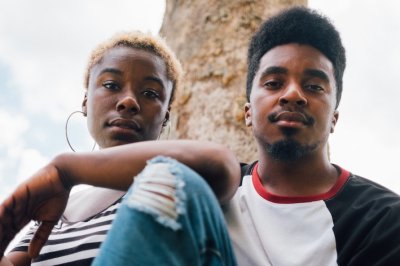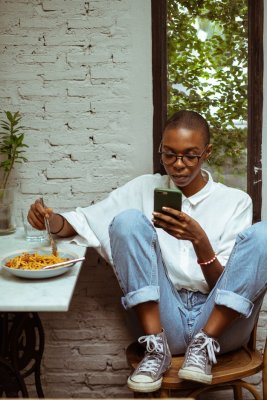Black Communities and Suicide – Is it On the Rise?

photo by Leilani Angel for Unsplash
by Claudia Cole
Black communities have started to come under the spotlight as overlooked and under represented when it comes to mental health support, but also when it comes to research and statistics. Suicides in Black communities is one such issue of growing concern.
Suicide risk and rates in Black communities
Following the tragic death of George Floyd, many people in the Black community shared a familiar sense of sadness and anger. A 2021 research study found that this impacted the mental health of many Black individuals, with a worrying rise in depression and anxiety symptoms.
The Covid-19 pandemic also affected Black communities, with those from a Black African or Black Caribbean background showing higher mortality rates. Younger people’s mental health was most at risk during this time of loss and isolation. A survey by digital health provider XenZone found an alarming increase in suicidal thoughts among Black and ethnic minority youths.
But the truth might need an even wider lens. In the United States, research looking at suicides across time within the Black community suggests that rates have been on the rise for a decade. Suggesting this has been an ongoing issue that hasn’t received the attention it deserves.
Is there a lack of data?
Over the years, the number of suicides among Black people has previously appeared to be much lower than other ethnic groups.
But with a lack of access to mental health care, some Black individuals face difficulties receiving a proper diagnosis.
And if there is stigma from within the community around mental health issues, families might also report other reasons for death.
A recent study published in the Journal of Racial and Ethnic Disparities showed that black suicides were more likely to be classified as ‘undetermined intent’. This means previous data may not reflect an accurate number of suicides, so the amount is likely more than what’s being shown.
The challenges Black individuals may face

photo by Joshua McKnight for Pexels
While there is no single cause for suicide or suicidal thoughts, many factors increase the risk. And Black individuals may encounter extra challenges.
1) Poor access to mental health support.
Due to racial barriers and unmet needs, it can be harder for Black people to access support. This can mean delays and sometimes a lack of treatment. It can also lead to some black individuals having a sense of mistrust, causing them to avoid seeking help.
2) Living in deprived areas.
Living or growing up in deprived areas has been associated with poor health and isolation. It can also increase ongoing stress levels due to struggling to make ends meet, dealing with poor housing, or fearing high crime levels. While evidently not all Black individuals live in deprived areas, British government statistics show they are among the higher percentage of ethnic groups that do.
3) Mental health stigma in Black communities.
In some communities and cultures, mental health is not always recognisable or spoken about openly. This can make it difficult to open up about our struggles with mental health with family and friends. It may also discourage people from getting the help they need.
Black males are particularly at risk. According to the UK’s Mental Health Foundation, men are three times more likely to die by suicide than women. Because of stigma and society’s expectations surrounding black masculinity, it can make it harder for men to reach out for support.
4) Discrimination and racial profiling.
Racial bias is another challenge many Black people face in their day-to-day lives.
Statistics from Britain’s Independent Office for Police Conduct shows that in 2022 Black people are nine times more likely to be stopped and searched by police in the UK.
A systemic review on police encounters shows that these interactions cause individuals to feel victimised and humiliated. Not only do they have a negative impact on a person’s mental health, but they can also lead to suicidal ideation.
The impact of viewing distressing content

photo by Ketut Subiyanto for Pexels
With increasing media use, race-related stress and trauma can also be experienced online.
Between constant news coverage and social media feeds, disturbing images or footage of racist incidents may be shared around.
Research shows that streaming distressing footage, such as recorded police brutality, is associated with high anxiety levels and depressive symptoms among black youths.
Can racism cause loneliness?
In a survey by The British Red Cross on loneliness in those of Black, Asian, and ethnic minority backgrounds, almost half of those who have experienced discrimination at work reported feeling lonely. Not only does this make Black individuals feel like they don’t belong, but it can also make them feel less valued and safe.
This can mean they then avoid getting involved in local activities, or accessing support. And leads to loneliness being more challenging to overcome, leading to a higher risk of suicidal thoughts and behaviours.
The upside of social media & future change
Although social media is often reflected in a bad light, it has many positive aspects that have helped towards much-needed change. In support of the Black Lives Matter movement, it continues to be a powerful outlet for black voices and activism. It allows people to raise awareness and connect with others in their community, making them feel supported and less alone.
Social media can also be a tool to educate others, addressing any cultural myths to help break the stigma. Above all, social media is a great way to share sources of support, making help more accessible to those in need. It’s important to keep the conversation going.
Support for Black communities
Despite the rising risks in the Black community, suicide is always preventable. It’s best to seek help at the earliest opportunity and encourage others to do the same. Here in the UK, alongside free helplines such as the good Samaritans, there are mental health charities that focus on supporting the black community. These include:
- Bayo (sharing black mental health collectives, organisations and services across the UK).
- Black Minds Matter (connecting Black individuals and families to free mental health services).
- Mind UK’s Black young men program ( a free three-year program for 11 to 30 year olds).
And a therapist provides a non-biased, non judgmental space. If your college or workplace don’t provide access to therapy and you are on a low budget, read our article on how to access free or low-cost therapy.
 Claudia Cole is a British mental health writer and advocate whose work has also appeared on Psych Central and KeiSei magazine.
Claudia Cole is a British mental health writer and advocate whose work has also appeared on Psych Central and KeiSei magazine.




